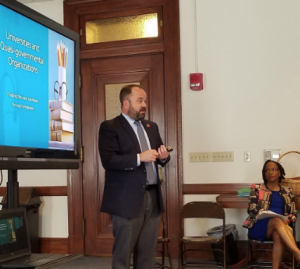By Tom Latek
Kentucky Today
There’s still no word on when Gov. Matt Bevin will call a special session of the General Assembly to address a public pension bill because he doesn’t appear to be enough votes to pass his proposal.
The governor’s Deputy Chief of Staff Bryan Sunderland, Budget Director John Chilton and Kentucky Retirement Systems Executive Director David Eger spent more than two hours briefing House Democrats on Monday afternoon.
A bill that would provide relief to the regional public universities and 118 quasi-governmental agencies, such as local health departments, was passed by the 2019 General Assembly from having their pension costs nearly double, was passed by lawmakers during their regular session, but was vetoed by Gov. Bevin, who said the bill contained errors and would break the inviolable contract with those employees.

Governor’s Chief of Staff Bryan Sunderland briefs lawmakers on the pension bill. (Kentucky Today photo)
Last week, Bevin administration officials briefed Republican lawmakers, who said afterward that they had many questions and concerns. The Monday afternoon session with House Democrats led to more of the same comments.
Sunderland told the Democrats that without relief, pension costs to the agencies, based upon the percentage of their payroll, need to be addressed. “We have universities that are in the untenable situation of going from about a 49 percent cost of their pensions to about 83 percent pension cost. It is a huge jump, a very financially taxing thing that by law, is going to go into effect July 1.”
He said they are trying to address that issue. “We tried to balance the needs of the quasi-governmental entities and the universities, the services that they need to provide, the employees that work in their organizations, and the financial condition of the Kentucky Retirement Systems as a whole.”
The proposed bill gives the universities and agencies a one-year freeze at the current rate, giving them time to decide if they want to remain in the system or not. If the agencies decide to leave, they could do it with a lump sum payment of their unfunded liability, or over a 30-year period with costs rising from the 49 percent level by one and a half percent per year during that time.
Sunderland says they will continue to talk with lawmakers. “When the General Assembly has the votes to pass this, I think the governor will exercise his option to call a special session.”
House Minority Whip Joni Jenkins, D-Shively, spoke with reporters after the briefing. “I would say members of the Democratic House caucus have some concerns going forward. I think I can say that we’re all very concerned about the future of rape crisis centers, domestic violence centers, child advocacy centers, mental health and public health, and their ability to stay alive with the contribution rate going up.”
Jenkins says if there is a special session, the Democrats would likely introduce a bill to freeze the pension costs for another year, then give the pension task force appointed by House and Senate leaders a chance to finish work on a comprehensive plan, in time for action in 2020 session, which is a budget year.
If the pension bill, which Chilton admitted was probably an appropriations bill, were to be acted upon this year, it would take 60 percent approval in both the House and Senate to pass. A vote during a budget year would only require a simple majority.



















